12 Sep 2014
The Power Of Education During Recovery
Education is a powerful force for anyone. Learning more about the world improves your quality of life. Earning degrees can help you get a better job, earn more income, and increase your sense of self-worth. For an addict in recovery, these are all important factors. Education can help you learn about your disease, about yourself and your choices, and can occupy your mind and take the place of thoughts about relapsing. Embrace learning and education to strengthen your recovery and your resolve to resist relapse.
What Should I Learn About Addiction?
 Your education begins as you work through your addiction. If you are getting professional help from a therapist, drug counselor, addiction specialist or a team of experts at a rehab facility, you are already learning about your disease. You are also learning about yourself and your motivations. These experts can help you investigate your choices and examine your past to help you learn how the disease of addiction has been at work in your life. This personal education can be a powerful way to help you heal.
Your education begins as you work through your addiction. If you are getting professional help from a therapist, drug counselor, addiction specialist or a team of experts at a rehab facility, you are already learning about your disease. You are also learning about yourself and your motivations. These experts can help you investigate your choices and examine your past to help you learn how the disease of addiction has been at work in your life. This personal education can be a powerful way to help you heal.
As you go through rehab you should also learn about addiction from an external perspective. Read up on how the disease works, how the drugs you have been taking have affected your brain and body, and how other addicts have coped and been successful in recovery. This knowledge is power and will only strengthen your ability to quit and stay sober.
How Can Education Help Me After Rehab?
Education can also help you stay sober after you have completed your rehab program. Rehab is a time for intense self-learning and for devoting yourself to learning about addiction and the role it has played in your life. Once you are sober and are firmly in recovery, education can help you stay that way. One of the most powerful tools to help you avoid relapsing is finding something, or many things, to replace your habit. Some people turn to religion, others devote themselves to exercise, while some develop new hobbies or are focused on work.
You can use any healthful activity to replace your addiction, but one of the best is education. Pick up wherever you left off. If this means going back to high school, enroll in an adult education program or work toward your high school equivalency diploma. If you never made it to college, search for programs that meet your needs. There many choices. Start out at a community college to take a couple of introductory courses, or apply to a university and start working toward a degree. If you have a career in mind, look for programs and schools that will help you achieve your goals.
By focusing attention on education and learning, there’s less room for thoughts about relapsing. Education can’t solve all of your problems, but it can be a powerful way to help you improve yourself, enhance your life, and stay clean.
What If I Can’t Afford To Go To School?
There are plenty of programs and scholarships that can help you get to school if you want to pursue an education. Furthermore, many schools offer night and weekend classes so that you can work while you earn a degree. Also consider that supportive family members might be willing to help you as you set off on a new, healthier stage in your life. Do whatever you can to get yourself an education so that you can get your life back on track.
Learn More About Preventing Substance Abuse Relapse
28 Aug 2014
How To Make The Most Out Of Rehab
Overcoming addiction is one of the biggest challenges that many people face. With dedication, support and the treatment administered by caring professionals in a rehab facility, all addicts have the ability to get clean and to learn to stay sober over the long term. Going through a successful drug rehab program takes effort on the part of the caregivers and the addict. If you are considering getting into rehab to treat your addiction, make the most of it in order to be successful.
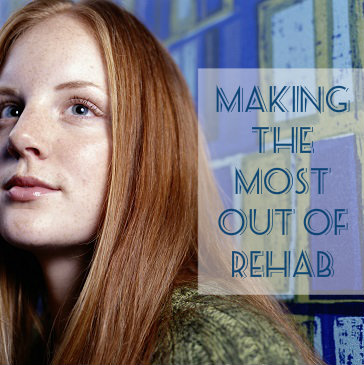 What Happens In Drug Rehab?
What Happens In Drug Rehab?
Start by learning what will happen when you enter a rehab facility. By being prepared ahead of time, you will give yourself a head start in the process of getting well. As you search for a facility for your care, hopefully with the support of a loved one, ask questions about what will happen when you enter treatment. Most likely you can expect to go through a detox and then get one-on-one counseling as well as participate in group therapy and support sessions. Beyond these basics, different facilities may use different activities and will operate based on different philosophies. Find out what those are before you start your treatment program.
Maintain A Positive Attitude While In Rehab
Going through rehab will be hard work. At times it will feel like you are failing, but when you keep your attitude positive, you will be more likely to succeed. Enter the process understanding that there will be ups and downs, but prepared to work hard for your sobriety and your healing. Remember that the first part, your detox, will be the hardest part, but that it will get easier from there. What happens during detox is that the drugs and alcohol leave your body and you feel sick as a result. When the withdrawal symptoms fade, you will be feeling better and ready to make it through your treatment.
Keep Up A Support System After Leaving Rehab
Having a support system is one of the best ways to ensure your success at getting and staying sober. No one can do this alone, and, once you leave treatment, your professional caregivers will no longer be there for you every day. Make sure you have at least one or two friends or family members willing to support you through this process. Involve these people as much as you can during rehab. If they are allowed to visit or participate, encourage them to do so. Words of encouragement for someone in rehab can make a world of difference, as can the support of loved ones afterward.
Drug rehab success rates statistics tell us that most addicts will relapse at some point after treatment. This does not mean that rehab was a failure, but it may mean that you need a tune up. Sometimes, making the most of the process means going back to try again and to get more help. Just remember to stay positive, to keep your support system around you and to not get discouraged by a small setback.
Learn More About Repairing Broken Relationships While In Rehab – Is Rehab The Time To Fix Relationships Or Just Yourself?
Call Us Now To Learn More About Drug Rehab – We Are Here For You…You Are Worth It.
11 Aug 2014
Empowering Addicts
Shame and stigma are two of the most common words associated with being an addict, both for those using and those in recovery. As a society we still largely view addiction as a moral failing, while science keeps telling us it is a medical condition. Too many addicts fail to get help because of the shame they feel and the stigma attached to the condition. When we can empower addicts to seek treatment instead of shaming them, we all benefit.
Empowerment Over Shame Of Addiction
 Addiction has long been viewed as shameful for many reasons. Abusing substances does begin with a personal choice. No one is forced to use drugs or to drink. For this reason we have long assumed that addicts continue to have a choice and that they can always choose to stop using and turn their lives around. What many fail to realize is just how powerfully drugs and alcohol impact the brain and body. Substances that are highly addictive change the brain and make it almost impossible to stop using them.
Addiction has long been viewed as shameful for many reasons. Abusing substances does begin with a personal choice. No one is forced to use drugs or to drink. For this reason we have long assumed that addicts continue to have a choice and that they can always choose to stop using and turn their lives around. What many fail to realize is just how powerfully drugs and alcohol impact the brain and body. Substances that are highly addictive change the brain and make it almost impossible to stop using them.
As researchers in addiction uncover these truths, we should start to view addicts differently, but it takes time to change minds. We need to move toward empowering addicts, rather than making them feel ashamed. Empowerment means being educated about the disease of addiction and having the confidence to get much needed treatment. When we can empower addicts, we can better help them.
Taking Action To Empower Addicts
The good news is that ideas about and attitudes toward addiction are changing. It takes time to make a societal shift, but slowly and surely it seems to be happening. There are people who are taking specific actions to lift the stigma attached to addiction and to empower addicts as a whole and as individuals.
For instance, a new trend is taking place that involves gathering recovering addicts in large groups to celebrate recovery and sobriety. In the UK, the Brighton Recovery Walk is in its fourth year, while the nationwide UK Recovery Walk is on year six. These events include a large gathering of recovering addicts, out to celebrate their sobriety without shame. These recovery walks show the faces of addiction and battle the stigma of this disease with a positive message of hope and empowerment. Similar events have begun to pop up in the U.S. as well.
Other empowering actions work with individual addicts. For instance, Stanford University created a program to educate women in recovery in the humanities. The lessons these women learn help to empower and strengthen their recovery by teaching them about facing obstacles, giving them new perspectives and expanding their horizons. Most of all the courses show them that they are worthy of learning and of working with Stanford professors.
Empowering Individuals In Your Life
If you have an addict in your life, consider how you can empower her. Educate her about her disease and options for treatment. Help her by supporting her when she needs it and by being there during difficult times. Encourage her to attend events like the Recovery Walks and to seek out other programs that are available to help women like her.
The more you talk about addiction and refuse to treat it like a shameful series of choices that someone has made, the more we can empower all addicts. With empowerment comes the confidence to reach out and get help. Today we have a number of ways to treat addicts that are effective and no one should feel too ashamed to ask for that help.
Check Out Additional Recovery Inspiration Posts!
06 Aug 2014
Tips To Cope With Relapse As A Woman
Addiction is a problem that affects both men and women. It doesn’t discriminate. But how we cope with addiction, how we heal from it and how we relapse does depend on our gender. As a woman your motivations for using drugs or alcohol again, after a period of sobriety, are likely different from a man’s. The best way to cope and get back on your feet will also differ for you as a woman. If you do relapse, realize that there are effective ways to help you cope and get sober again.
Women And Relapse
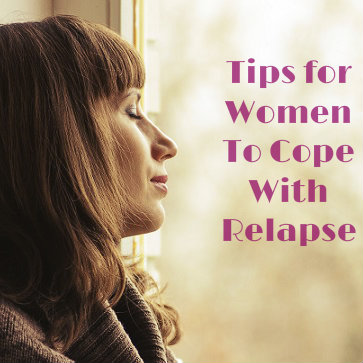 Researchers have found that there are differences between the genders with respect to addiction, treatment and relapse. One study looked at thousands of alcoholics, both men and women, receiving treatment. Each participant attended an assigned style of treatment, but all were allowed to go to support group meetings in addition to their official programs. All then reported on how they fared in terms of sobriety, relapse and support.
Researchers have found that there are differences between the genders with respect to addiction, treatment and relapse. One study looked at thousands of alcoholics, both men and women, receiving treatment. Each participant attended an assigned style of treatment, but all were allowed to go to support group meetings in addition to their official programs. All then reported on how they fared in terms of sobriety, relapse and support.
The researchers found that men who took advantage of support groups, such as Alcoholics Anonymous, did so to make non-drinking friends and to build up a support network to help them avoid the temptations of being around alcohol. For men, being in social situations with alcohol was the biggest trigger to relapse. The study found that this wasn’t the case for women. For us, the biggest trigger is emotional. Women used support groups to cope with their emotions, like depression or anxiety, which tempted them to relapse and start drinking again.
Women And Emotions
Knowing that as a woman your primary triggers for relapse are your feelings and state of mind, you have a powerful piece of information. Knowing your triggers is the key to avoiding them and avoid having a relapse. With emotions backing your relapse triggers, it is more important than ever to pay attention to and care for your emotional life. Here’s what you can do:
Tips To Cope With Relapse And Emotions
- Stay in counseling – Therapy or counseling sessions help you recognize, regulate, and control your emotions. Many people who have gone through rehab simply stop attending sessions thinking they no longer need the help. You may not need your therapist as often as you once did, but you still need some check-ups. Keep a regular, even if infrequent, schedule of counseling sessions for emotional maintenance.
- Practice relaxation techniques – When your emotions start to build and you feel angry, lonely or depressed, you may want to turn back to your habit. Instead, turn to meditation, yoga, and other practices that help you relax and re-focus. These can be very powerful ways to control your urges to relapse.
- Take care of your body – Too often we are too busy to take good care of ourselves, but our emotional states are connected to our physical states. Eat well, get plenty of sleep every night, and get regular exercise and you will feel better every day.
- Get involved – Being intellectually and socially engaged with the world around you can help you to better cope with your emotions. Having a support network is important in helping you resist relapse urges, but so is engaging your mind. Try new activities and develop new hobbies and skills.
As a woman you face unique problems associated with your addiction and your potential to relapse. Unlike men, we are driven to abuse substances by our emotions. We cope with our feelings by using drugs or by drinking. When you can learn to recognize your destructive emotions and cope with them, you can avoid relapsing and stay sober.
Read Our Other Informative Addiction Blogs To Help Women!
15 Jul 2014
5 Ways To Open Up In Recovery
It’s natural to feel resistant about going to rehab for your addiction. Seeking treatment means a whole world of new possibilities, many of which are frightening. You might fail the first time around. You might succeed and get sober only to realize you have no idea how to live without drugs or alcohol. These fears and resistance to going into rehab and therapy can make you want to clam up. Your best chance at successful recovery comes when you give yourself fully to the process, and this means opening up, sharing your weaknesses, and likely feeling vulnerable. Here’s how to get past your fears and misgivings and open up to your therapist and fellow recovering addicts.
5 Ways To Open Up In Addiction Recovery
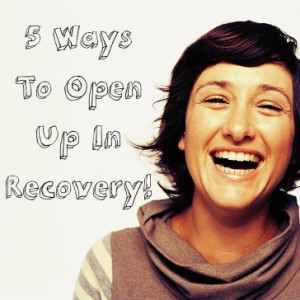 1. Commit To The Program
1. Commit To The Program
Despite all your reservations, fears and uncertainties, give yourself the best chance of success by committing to your treatment program from the beginning. If you go into rehab with a positive attitude and the willingness to do what it takes to get well, you will find it easier to open up to others as a part of your treatment.
2. Listen First
If you are feeling hesitant about opening up in therapy or group sessions, give yourself a little time to get comfortable. This is a completely new experience and you are out of your element. As you settle in, listen to those around you. Listen to your fellow patients opening up in group therapy. Absorb what they have to say and notice how the others react. No one is ridiculed for sharing personal stories and feelings, right? Listening to others will help you to realize that you are in a safe place and will help you feel comfortable about talking when it’s your turn.
3. Start A Journal
Opening up to others is a big step. Start with a baby step if you’re finding it difficult to do. Open up to yourself by writing down what you want to share with your therapist or your peers. As you begin to write down what you feel and what you have experienced, the task of saying these things aloud, and to others, will become easier to do.
4. Let Your Therapist Be Your Guide
You may not be asked to open up in a group session on the first day, but your counselor or therapist will want to hear from you in one-on-one talks right away. This may be easier than talking to a small group, but it’s still tough. Remember that your therapist is there to guide you through your treatment. Let her guide your sessions and what you talk about. The pressure is not all on you to decide what to say. Once you get going you may just find that you can’t stop talking.
5. Know When Not To Open Up
Your rehab facility, and especially your time with your therapist, should feel safe. While it’s natural to feel reluctant to speak up at first, you should be able to relax into the process of talking about yourself. If you just can’t do it, or your gut is telling you that something isn’t right, you might not be the problem. Not all programs or therapists are created equal. If you feel uncomfortable where you are, get out and find a program or a therapist that does feel right.
Opening up is never easy. When you have so much bottled-up shame and guilt because of your addiction, getting your feelings out in the open is both a challenge and a catharsis. Take steps toward opening up and you will reap the rewards of a true breakthrough.
See Our Other Posts With Helpful Recovery Tips – Recovery Is Possible!
Asking for help is never easy. It means admitting something you’d rather not and that you need other people. When you need help for addiction you may also feel ashamed or guilty. Perhaps most difficult is asking for help from the loved ones who have suffered because of your addiction. Asking for help is crucial because no one can overcome addiction alone. Be brave and talk to the loved ones you hurt. You may be surprised to find they still support you, no matter what.
How Do I Get Past the Shame Of Addiction?
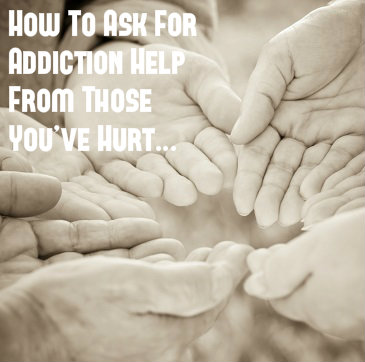 Shame is a terrible symptom of substance abuse and addiction and a common roadblock to asking for help. Understand that it is normal to feel this way. The natural response to the shame that accompanies addiction is to bury it and to deny having a problem, but this won’t help you in the long run. Shame means realizing that you are imperfect and once you accept that fact, asking for help becomes easier. No one is perfect and knowing this fact can help you connect with your loved ones who will most likely be ready to support you, even though you hurt them in the past.
Shame is a terrible symptom of substance abuse and addiction and a common roadblock to asking for help. Understand that it is normal to feel this way. The natural response to the shame that accompanies addiction is to bury it and to deny having a problem, but this won’t help you in the long run. Shame means realizing that you are imperfect and once you accept that fact, asking for help becomes easier. No one is perfect and knowing this fact can help you connect with your loved ones who will most likely be ready to support you, even though you hurt them in the past.
Learning more about your addiction can also help you to let go of shame. Read up on addiction and the latest research findings and you will see that it is a disease. Being addicted started with a choice you made, but it persists because it is a true illness that affects you physically and psychologically.
How Do I Get Past The Fear Of Rejection?
Another major roadblock to asking your loved ones for help is the fear that they will turn their backs on you. Why shouldn’t they? After all, you have broken their trust, let them down and maybe you even hurt them emotionally or physically because of your addiction. You probably see yourself now as unworthy of their love and help.
You have to see yourself as worthy of your loved ones’ time and attention. If you can’t see that, you may never ask for the help you desperately need. Think back to a time before your addiction. Remember the kind of person you were and the relationships you had with your family. Maybe you and your sister were best friends. You can probably remember a time when you were a help to your parents, rather than a burden. When you can remember the positives in the past, you can imagine a future in which you are sober again. Your loved ones will remember the old you too and will not likely reject your request for help.
How Do I Ask For Help?
Once you have recognized, acknowledged and gotten past your shame and fear, it’s time to take action. First, pick the person you think is most likely to be ready and willing to support you as you seek recovery from your addiction. For most people this means turning to a close family member, like a parent or a sibling. You know your family and friends best, so choose the person or people you think will help you in spite of all you have done to hurt them.
It never hurts to practice, so plan what you want to say. You might want to start with apologies, but be sure to stick with the main message, which is that you are ready to get help. Acknowledge out loud to your loved ones that you hurt them. They will appreciate that you are not ignoring your past wrongs. Also find a time that is conducive to a long talk. Don’t stop your loved ones on their way out the door. Take the time to find your voice and the courage you need to speak up. You may be pleasantly surprised to find that your loved ones are still there for you.
Read Our Other Inspirational Addiction Posts – Healing From Addiction Can Be Yours Today!
Twelve-step programs are mutual self-help programs that use a combination of gradual goals (i.e., steps) and peer support to help recovering substance addicts establish and maintain a long-term commitment to avoiding further substance use. However, not all people who join these programs attend regularly or successfully abstain from substance intake. In a study published in May 2014 in the journal Addiction, researchers from the U.S. and Norway assessed the effectiveness of a technique called motivational intervention in helping 12-step participants increase their program involvement and their ability avoid substance relapses.
12-Step Approach
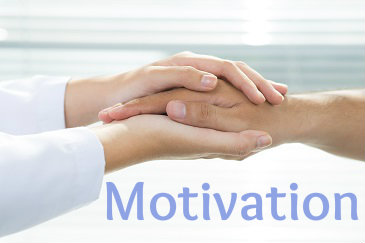 The 12-step approach was initiated in the 1930s with the formation of Alcoholics Anonymous. Participants in 12-step-based programs commit to a progressive series of actions designed to help them recover from active involvement in the use of alcohol or other substances of abuse. These actions including admitting a lack of self-control over addictive behaviors, making a call to a higher or greater power to assist in the recovery process, examining and atoning for damaging conduct while under the influence of drugs or alcohol, and eventually providing assistance to others not as far along the path of recovery. As a rule, 12-step programs rely heavily on peer sponsorship provided by longer-term members. The 12-step approach is widely used and has proven effective as an aid to the substance recovery efforts carried out in treatment centers that deal with problems such as alcohol addiction, cocaine addiction and opioid narcotic addiction.
The 12-step approach was initiated in the 1930s with the formation of Alcoholics Anonymous. Participants in 12-step-based programs commit to a progressive series of actions designed to help them recover from active involvement in the use of alcohol or other substances of abuse. These actions including admitting a lack of self-control over addictive behaviors, making a call to a higher or greater power to assist in the recovery process, examining and atoning for damaging conduct while under the influence of drugs or alcohol, and eventually providing assistance to others not as far along the path of recovery. As a rule, 12-step programs rely heavily on peer sponsorship provided by longer-term members. The 12-step approach is widely used and has proven effective as an aid to the substance recovery efforts carried out in treatment centers that deal with problems such as alcohol addiction, cocaine addiction and opioid narcotic addiction.
Motivational Interventions
Many people who enter substance recovery programs do so with mixed feelings about the recovery process. In fact, significant numbers of program participants enter treatment only at the urging of others. People with ambivalent or hostile feelings toward substance recovery commonly fail to participate fully in their programs, meet the specific objectives that programs set for their clients/patients or successfully complete their program involvement. Motivational interventions are designed to help program participants uncover the mixed or negative feelings they may have about substance recovery, and also to help them change their minds and become more willing and proactive in their treatment. As a rule, practitioners of motivational interventions work cooperatively with clients/patients in an interactive process that strives to avoid a confrontational or antagonistic atmosphere. While a motivational intervention can help at almost any stage of treatment, it typically has its biggest impact in the initial stages of recovery.
Usefulness In 12-Step Programs
In the study published in Addiction, researchers from Stanford University, the Department of Veterans Affairs and Norway’s University of Oslo and Sorlandet Hospital used an examination of 140 Norwegians receiving treatment for alcoholism to assess the usefulness of motivational interventions in promoting involvement in 12-step programs. All of these study participants were in inpatient facilities for alcohol detoxification. Half of the participants received a motivational intervention called 12-step facilitation in two 30-minute sessions. This form of intervention is designed to increase clients’/patients’ level of comfort with 12-step involvement. The facilitation sessions provided during the study included detailed explanations of how substance addicts lose control over their behaviors, a DVD on the 12-step process created by Alcoholics Anonymous and immediately available resources for making direct contact with 12-step groups. The other half of the study participants received only basic advice on 12-step resources in a brief informational session.
Six months after the study participants concluded their involvement in inpatient detoxification, the researchers compared the level of 12-step involvement among the people who received motivational interventions to the level of involvement among the people who only received brief advice on 12-step resources. They concluded that the participants who received motivational interventions were significantly more likely to attend 12-step meetings than those who received only brief advice. They also concluded that the motivational intervention group used both alcohol and drugs on fewer total days than the brief advice group.
Despite the increased 12-step involvement and fewer days of substance use, the authors of the study published in Addiction concluded that the recovering alcoholics who received motivational interventions did not remain abstinent from substance use any more often than their counterparts who received brief advice on available 12-step resources. In addition, motivational intervention did not lead to a decrease in the severity of alcohol-related symptoms. Still, the authors note that, since motivational intervention recipients do attend 12-step meetings more often and use drugs and alcohol on fewer days, the technique may prove useful as part of the recovery process for alcoholics who go through alcohol detoxification.
22 Apr 2014
Repairing Broken Relationships While In Rehab
You have finally made the decision to get into rehab and get help for your addiction. Your habit has probably wreaked a lot of havoc in your life. You may have chronic health problems, your finances may be in the toilet, you may have lost your job, or you may have gotten into legal trouble. Perhaps the worst casualties of your addiction, however, are your relationships. Addicts often hurt the ones they love while focused solely on the needs dictated by their disease. Now that you’re going into rehab, should you work on those relationships or focus on your recovery alone?
What Are the Most Important Relationships In Rehab?
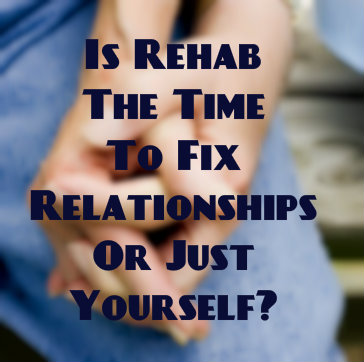 As you enter rehab you will find that there are several relationships to cultivate. You will need to develop a working and trusting relationship with your counselor or therapist. This person will be instrumental in helping you to get better. You do need to work on this relationship, but remember that it is a professional one. If you struggle to trust this person, be honest about it. Your therapist will not take it personally if you want to request to work with someone else.
As you enter rehab you will find that there are several relationships to cultivate. You will need to develop a working and trusting relationship with your counselor or therapist. This person will be instrumental in helping you to get better. You do need to work on this relationship, but remember that it is a professional one. If you struggle to trust this person, be honest about it. Your therapist will not take it personally if you want to request to work with someone else.
You will also find that you will develop several relationships with peers while in rehab. These are crucial to your success. No one can go it alone, especially when trying to overcome addiction. Your peers have the unique perspective that you also have. They understand where you have been, where you’re going, and what your experience in rehab is like. While leaving romance out of the picture, which can complicate things, cultivate relationships with these people who will be able to support you during rehab and for years to come.
Can I Work On Repairing Relationships In Rehab?
In addition to the professional and peer relationships that you develop in rehab, you will also begin to forge a relationship with yourself. You will begin to learn more about your motivations for abusing substances, why you were susceptible to addiction, and how you can stay sober. This is essential to your recovery, and should be your main focus.
Although you are focusing on yourself, you may still be able to work on the relationships you damaged with your addiction. Consult your therapist to decide whether it is best for you to wait or to delve into that project while in rehab. If you both think you can handle getting to work on relationships, your therapist may want to set up family sessions. Together you can work toward regaining the trust of your loved ones and they can start to forgive you.
What If I Wait Until After Rehab To Fix Relationships?
If you and your therapist feel you need to focus solely on yourself during rehab, bring in your loved ones so that your therapist can explain the decision. They may feel hurt initially and wonder when it will be their turn. Your therapist can help them to understand the importance of devoting rehab time to your immediate needs.
Another option is for your loved ones to begin their own therapy sessions. The impacts of your addiction have probably hurt them, caused them to feel angry and used, or even traumatized them if abuse was involved. If your loved ones can begin to work with a therapist while you go through rehab, you will all be on the right track toward repairing your relationships together.


